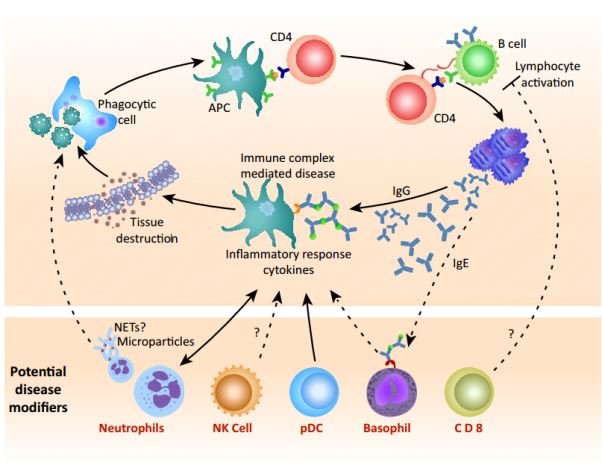Immunology
Overview of Immunology

Immunology is a bio medical science that studies the immune response of an organism against the original substance and its methods. Immune response is not only the response of the organism to antigen stimulation, but also a biological process of recognizing and eliminating antigen substances. Many components of the immune system are typically cellular in nature and not associated with any specific organ; but rather they are embedded or circulated in various tissues located throughout the body. Immunology has applications in numerous medical disciplines, particularly in the fields of organ transplantation, oncology, rheumatology, virology, bacteriology, parasitology, and dermatology.
Branch of immunology
Tumor immunology is a science that studies the pathogenesis, prevention, diagnosis and treatment of tumors by using the theory and method of immunology. It is one of the branches of immunology.
Reproductive immunology is an important subject developed with the progress of reproductive medicine and immunology. It involves reproductive physiology, pregnancy physiology, pathological pregnancy and reproductive control.
Molecular immunology is a subdiscipline of immunology. It uses modern biochemical techniques to study the structure and function of immune molecules. Molecular immunology has made outstanding achievements complement research.
Immunology and health
Modern immunology holds that the immune function of the body is a response to antigen stimulation, and the immune response is manifested in the ability of the immune system to recognize itself and exclude non-self. Recognition is an important prerequisite for the immune system to play its immune function.
In the early 21st century, our research on immunology has reached the level of cells and molecules. People are trying to explore the basic physiological law of organism - the self-stabilization mechanism of immunity. These explorations are conducive to solve many important medical problems, such as autoimmunity, hypersensitivity, tumor immunity, transplantation immunity and immunogenetics.
Disorders of the immune system can result in autoimmune diseases, inflammatory diseases and cancer. Immunodeficiency occurs when the immune system is less active than normal, resulting in recurring and life-threatening infections. In contrast, autoimmunity results from a hyperactive immune system attacking normal tissues as if they were foreign organisms.
Development and Application
Modern immunology has gradually developed into an independent subject with its own theoretical system and special research methods. It provides some new means for biological research.
At the beginning of the 20th century, people have used immunology to distinguish human blood groups. Immunological techniques have also been used in the study of plant and animal toxins. For example, people use immunological techniques to study diphtheria toxin and tetanus toxin, and then use them to study plant toxins, such as ricin and Croton toxin. Some new technologies developed in the early 21st century, such as radioimmunoassay, immunofluorescence and enzyme immunoassay, have provided practical research means for biology.
The emergence of monoclonal antibody technology has become a major breakthrough in the field of immunology. Monoclonal antibodies can be used to detect the surface molecules of various immune cells and other tissues, which is of great significance for the isolation, identification and classification of immune cells and the study of the structure and function of various membrane surface molecules.
Research hotspots
At present, the research of immunology is more extensive. It has gone from cell level to molecular and gene level. The theory of immunology has been greatly enriched and improved. At the same time, many new research directions and hotspots have emerged, such as the differentiation and development of immune cells, functional regulation and the discovery of new immune cells. Clinical immunology has more obvious clinical value, and more attention has been paid to the application of immunological techniques and methods in the research and treatment of diseases. At present, the research hotspots of immunology mainly include the cellular and molecular mechanisms of immune regulation, the structural basis and related mechanisms of immune recognition, inflammation and innate immune regulation, immunotherapy and immune memory. Basic immunology provides theoretical guidance for the development mechanism and treatment of many immune-related diseases, such as HIV vaccine development, and targeted drug therapy for rheumatoid arthritis.
References:
- Lee DK, Hakim FT, Gress RE. The thymus and the immune system: layered levels of control. Journal of Thoracic Oncology. 2010, 5 (10 Suppl 4): S273–6.
- Verthelyi D. Sex hormones as immunomodulators in health and disease. International Immunopharmacology. 2001, 1 (6): 983–93.
- Benten WP, Stephan C, Wunderlich F. B cells express intracellular but not surface receptors for testosterone and estradiol. Steroids. 2002, 67 (7): 647–54.
- Kanda N, Tamaki K. Estrogen enhances immunoglobulin production by human PBMCs. The Journal of Allergy and Clinical Immunology. 1999, 103 (2 Pt 1): 282–8.